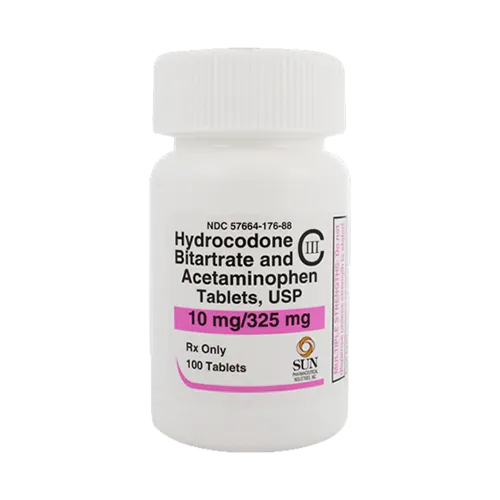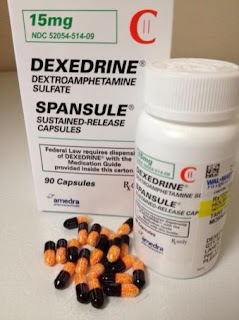What Is Hydrocodone Bitartrate?
Hydrocodone Bitartrate is an opioid painkiller composed of hydrocodone, a full opioid agonist, and bitartrate, a salt that enhances the solubility of the active compound. Hydrocodone works by attaching to specific opioid receptors in the brain and spinal cord, altering the way pain is perceived and reducing the sensation of pain.
Unlike some other opioids, hydrocodone is relatively selective for the mu-opioid receptor, although at higher doses, it may affect other opioid receptors as well. This action helps relieve moderate to severe pain, and it is often prescribed for post-surgical pain, fractures, or chronic conditions where less potent pain relievers are ineffective.
Is Hydrocodone Bitartrate the Same as Hydrocodone?
Yes, Hydrocodone Bitartrate is essentially the same as hydrocodone, but in its salt form. The bitartrate enhances the solubility of the hydrocodone, making it easier for the body to absorb and process. Hydrocodone is a narcotic analgesic, and the bitartrate version is commonly found in prescription pain relievers. The two terms are often used interchangeably when referring to hydrocodone-based medications.
Hydrocodone Bitartrate – How It Works
Hydrocodone is a full opioid agonist that interacts with opioid receptors in the brain and spinal cord to reduce pain perception. It releases naturally occurring, opioid-like compounds to block pain signals, providing effective pain relief for moderate to severe pain.
-
Pain Relief: Hydrocodone works primarily on the mu-opioid receptors, which are responsible for pain transmission and mood regulation.
-
CNS Effects: While it is highly effective for pain relief, hydrocodone can also cause central nervous system (CNS) depression, leading to drowsiness, dizziness, and even respiratory depression at high doses.
Common Uses of Hydrocodone Bitartrate
Hydrocodone Bitartrate is primarily used for the following:
-
Post-surgical pain relief: After surgeries like joint replacement or spinal procedures.
-
Pain from severe injuries: Including fractures and muscle injuries.
-
Chronic pain management: For long-term conditions such as arthritis or cancer-related pain.
-
Cough suppressant: In liquid formulations, hydrocodone is used to relieve persistent cough.
Drug Interactions with Hydrocodone Bitartrate
Several medications can interact with Hydrocodone Bitartrate, potentially affecting its effectiveness or increasing the risk of severe side effects. Here are some common drugs that may interact with hydrocodone:
-
Antibiotics (e.g., erythromycin)
-
Antidepressants (e.g., SSRIs, tricyclics)
-
Anticonvulsants (e.g., carbamazepine)
-
Antipsychotics (e.g., olanzapine, quetiapine)
-
Benzodiazepines (e.g., diazepam, lorazepam)
-
Alcohol or other CNS depressants
Always inform your healthcare provider about any medications you are taking to avoid dangerous interactions.
Precautions and Warnings for Hydrocodone Bitartrate
Due to its potential for abuse and dependence, Hydrocodone Bitartrate should be used with caution. Important considerations include:
-
Risk of Addiction: Hydrocodone can be highly addictive, especially with prolonged use.
-
Respiratory Depression: At higher doses, hydrocodone can cause breathing problems, which can be life-threatening.
-
Storage: Keep this medication out of reach of children and in a secure location to prevent misuse.
Hydrocodone Bitartrate Dosage and Administration
Hydrocodone Bitartrate is usually prescribed in tablet form (often in combination with acetaminophen) or liquid form. The recommended dosage will vary based on the severity of pain, the patient’s condition, and their previous use of opioids.
-
Tablets: Typically, 1 tablet every 4 to 6 hours as needed for pain relief. Do not exceed the prescribed dose.
-
Liquid Form: Follow the prescribed amount per dose, often taken every 4 to 6 hours.
FAQs – Hydrocodone Bitartrate
What is Hydrocodone Bitartrate used for?
Hydrocodone Bitartrate is used to treat moderate to severe pain and is also found in cough suppressants to treat persistent coughing.
Is Hydrocodone Bitartrate addictive?
Yes, Hydrocodone Bitartrate has a high potential for abuse and addiction, especially if taken in higher doses than prescribed.
How does Hydrocodone Bitartrate work?
Hydrocodone works by binding to opioid receptors in the brain and spinal cord, altering how the body perceives pain. It also produces a sedative effect, which can cause drowsiness and relaxation.
Can I take Hydrocodone Bitartrate with other medications?
Hydrocodone can interact with many drugs, including antidepressants, antibiotics, and CNS depressants. Always consult your doctor before taking any new medications.
What are the side effects of Hydrocodone Bitartrate?
Common side effects include drowsiness, dizziness, constipation, and nausea. Serious side effects may include respiratory depression and addiction.
How should I store Hydrocodone Bitartrate?
Store Hydrocodone in a secure, dry place, away from children and pets. Keep it at room temperature and avoid storing it in moist environments like bathrooms.
Conclusion
Hydrocodone Bitartrate is an effective treatment for moderate to severe pain and can also serve as a cough suppressant. While it is highly effective, it carries the risk of addiction, overdose, and respiratory depression. Always follow the prescribed dosage and consult with your healthcare provider about any concerns regarding drug interactions or side effects.
If you’re looking for reliable pain relief, Hydrocodone Bitartrate may be an appropriate option, but its use should be carefully monitored to ensure safety and effectiveness.

 Best stimulant drugs
Best stimulant drugs Medical Psychedelics
Medical Psychedelics Pharmaceutical weight loss drugs
Pharmaceutical weight loss drugs Steroids for sale
Steroids for sale












Reviews
There are no reviews yet.